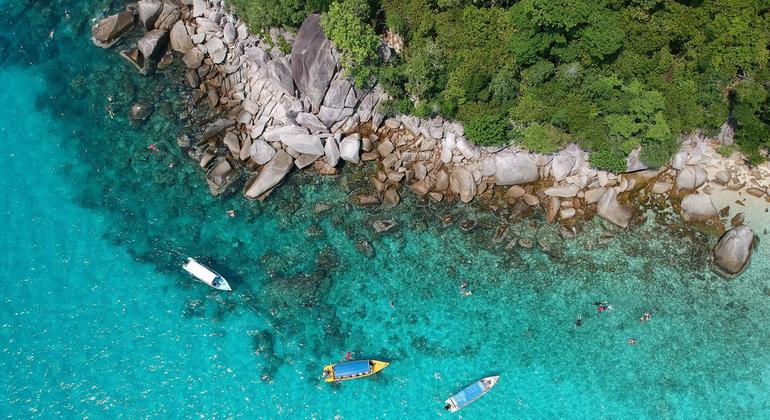Tourism can be a real rollercoaster ride with climate craziness, political drama, and pesky pandemics lurking around the corner!
 The President of the UN General Assembly on Tuesday highlighted the urgent need to boost sustainable and resilient tourism practices to protect the environment while continuing to benefit local economies.
The President of the UN General Assembly on Tuesday highlighted the urgent need to boost sustainable and resilient tourism practices to protect the environment while continuing to benefit local economies.
Addressing a high-level meeting on tourism as part of the General Assembly’s first ever Sustainability Week, Dennis Francis said it was a vital driver of economic growth and empowerment.
In 2023, the sector contributed three per cent to the global gross domestic product (GDP), amounting to $3.3 trillion, and employed one in every ten people worldwide. For countries in special situations, like small island nations, tourism accounted for nearly 35 per cent of all export earnings and up to 80 per cent of national exports.
“Despite the spectacular benefits reaped across its vast supply chains – tourism is also intrinsically susceptible to a host of disruptive forces – such as climate change, pandemics, acts of terrorism, and domestic political instability,” Mr. Francis said.
Tweet URL
Sustainable
He expressed concerns about the sector’s environmental and carbon footprint, saying sustainability must be paramount.
“We need a global tourism sector that is sustainable – one with deep local value chains that expand demand for locally made products and services in ways that also directly and positively benefit local communities,” he urged.
Moreover, he emphasized that the sector should also leverage digital technology to foster innovation and expand opportunities for jobs and economic growth, especially for women, youth, and indigenous and local communities.
Resilient
“We also need a global tourism sector that is resilient,” said Mr. Francis, stressing the need to minimize its vulnerabilities and bolstering its ability to withstand external shocks.
This includes designing infrastructures that can withstand environmental disasters, fostering innovations that enhance economic and social resilience, and diversifying tourism activities to reduce recovery time after disruptive events.
Symbol of hope
Zurab Pololikashvili, head of the UN World Tourism Organization (UNWTO), also spoke at the General Assembly, noting that despite today’s pressing challenges, tourism offered a glimmer of hope.
Reflecting on the sector’s recovery from the COVID-19 pandemic – its most significant crisis in history – he observed that in 2023, international arrivals rebounded to almost 90 per cent of pre-pandemic levels, with full recovery expected by the end of 2024.
This recovery must serve as a catalyst for bold action and transformative change, he said, emphasizing, “tourism can – and must – be a part of this plan for a better future for all.”
Sustainability Week
The high-level event on tourism followed Monday’s deliberations on debt sustainability, where speakers outlined the crippling impact of debt on developing economies, and called for urgent reform of the global financial system.
Upcoming highlights of the week include dedicated discussions on sustainable transport, infrastructure and energy.
Elliot is an award-winning journalist passionate about international affairs and humanitarian causes. Elliot has covered stories from conflict zones and areas devastated by disasters, highlighting critical global issues.




Despite the spectacular benefits reaped across its vast supply chains – tourism is also intrinsically susceptible to a host of disruptive forces – such as climate change, pandemics, acts of terrorism, and domestic political instability.
How can the tourism industry effectively address the challenges posed by climate shocks and political unrest while maintaining economic benefits?
The tourism industry can effectively address the challenges posed by climate shocks and political unrest by implementing sustainable and resilient practices. By focusing on enhancing local value chains and promoting demand for eco-friendly tourism, it can mitigate the negative impacts on the environment while continuing to support local economies.
Despite the spectacular benefits reaped across its vast supply chains – tourism is also intrinsically susceptible to a host of disruptive forces – such as climate change, pandemics, acts of terrorism, and domestic political instability.
DianaSmith believes that the tourism industry is indeed vulnerable to various global challenges such as climate change, political unrest, and pandemics. She emphasizes the importance of adopting sustainable and resilient practices to protect the environment and support local economies.
As a travel enthusiast, it’s concerning to see how tourism, despite its economic benefits, is vulnerable to various crises like climate change and pandemics. Mr. Francis rightly emphasizes the importance of boosting sustainable practices to protect our environment while still supporting local economies.
Despite the potential benefits of tourism for economic growth, it’s essential to prioritize sustainability to minimize the sector’s negative impacts on the environment and local communities. Climate change, political unrest, and pandemics pose significant challenges that need to be addressed for a more resilient tourism industry.
Addressing a high-level meeting on tourism as part of the General Assembly’s first ever Sustainability Week, Dennis Francis said it was a vital driver of economic growth and empowerment. In 2023, the sector contributed three per cent to the global gross domestic product (GDP), amounting to $3.3 trillion, and employed one in every ten people worldwide. For countries in special situations, like small island nations, tourism accounted for nearly 35 per cent of all export earnings and up to 80 per cent of national exports. Despite the spectacular benefits reaped across its vast supply chains – tourism is also intrinsically susceptible to a host of disruptive forces – such as climate change, pandemics, acts of terrorism, and domestic political instability,” Ms. Summers said.
As a traveler myself, I understand the importance of sustainable tourism practices for preserving our planet while supporting local communities. It’s crucial that we prioritize environmental protection and reduce our carbon footprint in the tourism industry to ensure a brighter future for all.
As EmilySmith, I believe that sustainable tourism practices are crucial in today’s world. We must prioritize protecting the environment while ensuring economic benefits for local communities.
Isn’t it alarming how the tourism industry is facing multiple challenges like climate craziness, political drama, and pandemics? How can we ensure sustainable practices amidst all these uncertainties?